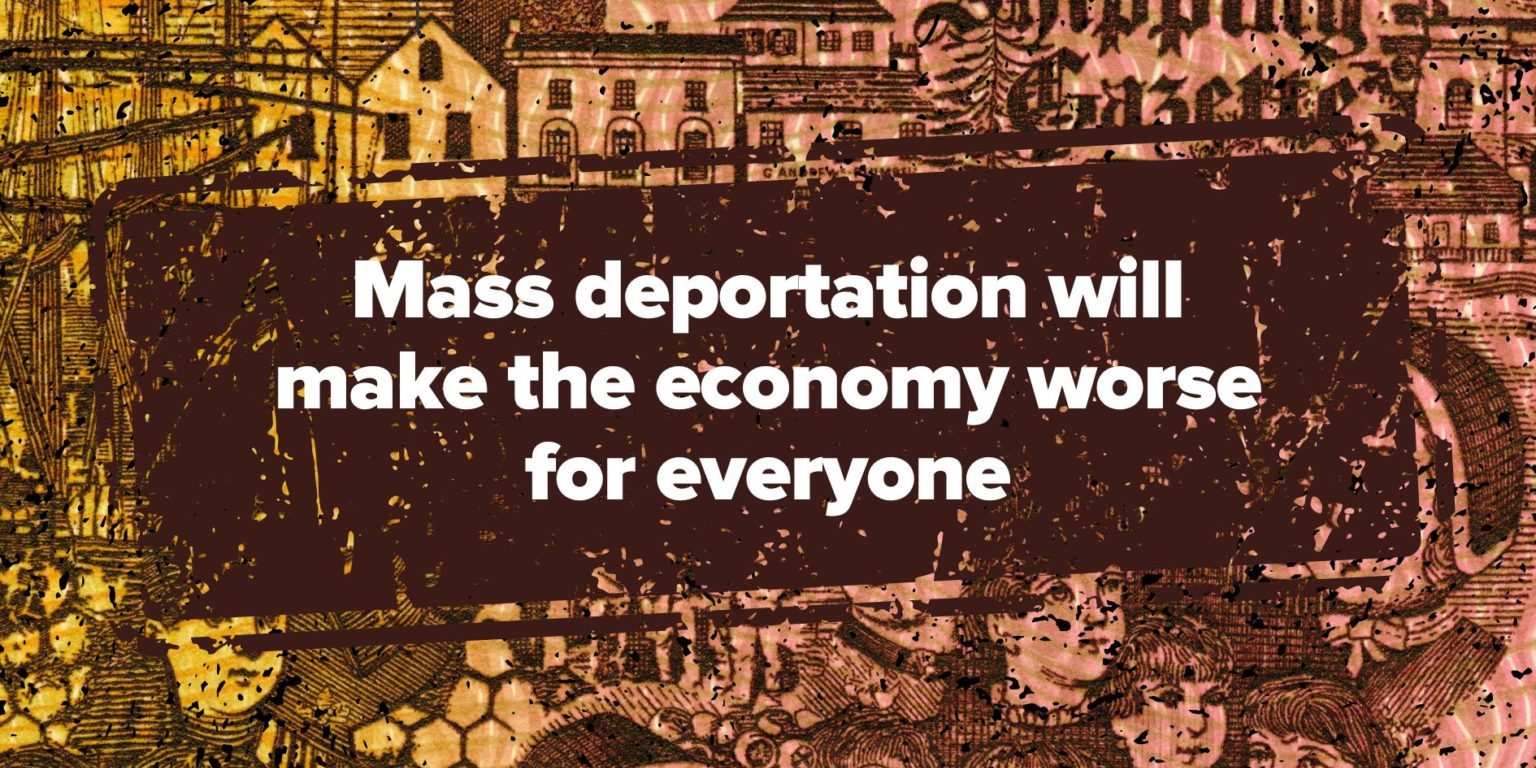Updated on Oct 15, 2024
Mass Deportation Will Make the Economy Worse for Everyone

Republicans are counting on the fact that fear will win this election cycle. But all of us will suffer if it does.
8
VERIFIED SOURCES
Donald Trump has made mass deportations the centerpiece of his closing argument as November approaches. He is threatening to go it alone by invoking the Alien Enemies Act of 1798 to detain and deport immigrants. Generally, Congress has to use its power to provide the president with wartime privileges under the act, but Trump is claiming he can invoke the law unilaterally to address a “threatened or ongoing invasion.”
Presidents and legislators have agreed since the law’s inception that “invasion” should be taken literally. The most recent example of this is the mass detention of Japanese citizens in American camps after the attack at Pearl Harbor. A shameful piece of America’s past to which we should not aspire, but legally, an invasion.
To claim the roughly 12 million undocumented people currently living in the United States are part of a current invasion is farcical. Over 80 percent of those who reside in the U.S. without documentation arrived before 2010. Over 5 million people entered the country illegally between 1999 and 2007. The average undocumented person has lived here for over 16 years. Many who were brought as young children do not remember their native countries and some did not know they were undocumented until they reached adulthood.
These are people with jobs and homes and businesses. These are people living in mixed-status households where deportation means tearing a mother or father away from a family making it more likely the American citizens who remain fall into poverty. In fact, mass deportation threatens all Americans’ livelihoods — even those cheering for the policy. Here’s how.
Removing Economic Contributions
The idea that mass deportations will stimulate the economy relies on the false assumption that immigration is a zero-sum game. That is, for every immigrant who gets a job, one U.S.-born person loses a job. But the economy is more complicated than that.
First, immigrants take jobs that U.S.-born citizens tend not to want. The nature of migrant labor makes counting difficult but estimates are that roughly 40-50 percent of the nation’s farm laborers are undocumented. In 2011, when Georgia passed a tough anti-immigration law, crops were left to rot in fields even with the government offering bonuses and incentives to U.S.-born workers to pick them. According to the Georgia Fruit and Vegetable Growers Association, Georgia farmers lost $74.9 million in unpicked crops over the spring and summer.
When jobs disappear in positions like farm workers or child care or construction, this has ramifications up the employment ladder. If contractors do not have enough labor, they must cut down on projects and therefore aren’t hiring managers. If restaurants can’t staff kitchens, they don’t hire servers, who are more often U.S.-born. When parents do not have child care, they must leave the workforce, further stifling demand.
Second, immigrants are built into the fabric of society. They buy food and services and pay rent. They go to movies and get gifts for their children and drive cars that need to be serviced. When they suddenly disappear from society, that demand disappears as well, causing contraction and job losses across the board.
“Economists have now shown several reasons why the economy is not a zero-sum game: because unauthorized immigrants work in different occupations from the U.S.-born, because they create demand for goods and services, and because they contribute to the long-run fiscal health of the country.” – Brookings
The tax contributions of undocumented immigrants must also be considered. Undocumented individuals pay more into the system than they receive, as they are not eligible to receive public benefits. Immigrants with undocumented status pay $25.7 billion in Social Security taxes. In 2022, undocumented immigrants contributed $96.7 billion in taxes, approximately 60 percent to the federal government and 40 percent to states. This money provides services to all American citizens.
Negative Outcomes by the Numbers
Several studies have looked at the effects of deportation policies and have found measurable declines in jobs and GDP growth during periods of high deportation.
Between 2008 and 2014 as a part of the Secure Communities program, approximately half a million immigrants were removed from the U.S.
Data show that one U.S.-born worker lost a job for approximately every 10 undocumented workers who were deported. When those numbers are applied to the removal of 12 million people, the U.S. labor market would see a loss of approximately 1 million jobs.
In addition, the sudden removal of essential workers in construction, home care, the service industry and farm work, among other industries, would cause a market contraction and sharp increase in inflation. The U.S. could lose approximately 60 percent of its food market to growers in other countries because the labor to run American farms would not exist. This is a recipe for food shortages and higher food prices.
Independent analysis of Trump’s plans say they would increase government spending by up to $1 trillion. At the same time, the price of services increase 10 percent by 2029 and the economy would shrink nearly 6 percent — a loss of $1.6 trillion.
Republicans are counting on the fact that fear will win this election cycle. But all of us will suffer if it does.
Facts work the best when shared with friends. ..
SOURCES
Trump’s Deportation Plan Would Cost Nearly $1 Trillion, Reason
Mass Deportation
Devastating Costs to America, Its Budget and Economy, American Immigration Council
Mass Deportations Would Impoverish US Families and Create Immense Social Costs, Center for Migration Studies
The Alien Enemies Act, Explained, Brennan Center for Justice
Key facts about the changing U.S. unauthorized immigrant population, Pew Research
Crackdown on illegal immigrants left crops rotting in Georgia fields, ag chief tells US lawmakers, AP
The labor market impact of deportations, Brookings
How Trump’s “Mass Deportation” Plan Would Ruin America, Mother Jones

FactPAC is dedicated to supporting a robust and fair Democracy by getting the facts to voters. FactPAC is an unconnected political action committee that has no affiliation with any other organizations or campaigns. We are donor-supported and volunteer-run.


























